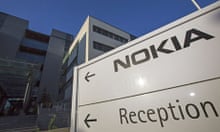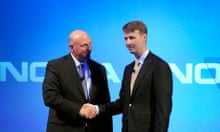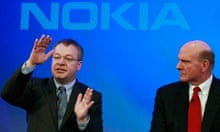The central object in Finland's national epic poem the Kalevala is the Sampo, a magical machine that produces money, flour and salt. The device is stolen and taken away over the sea, but along the way falls into the water and is lost.
For Finns contemplating the final indignity for its modern-day magical machine, Nokia, the analogy is as unavoidable. From humble beginnings as a paper mill set up 150 years ago in the small town of Nokia in southern Finland, the company became the country's global claim to fame before subsiding under a withering assault from Apple and others. Finally this week, its mobile phone business was sold to Microsoft.
"Tuesday was a very sad day for me," said Päivi Tuohimaa, who spent 14 years at Nokia as a senior manager. "I was responsible for Nokia brand identity for years and am really sorry that all that will be destroyed now. But life goes on."
"The emotional impact is of course significant," added Alf Rehn, chair of management and organisation at Åbo Akademi University. "It is the end of an era, and as Finland's internal and external image has been bound up in Nokia, this will change the mental makeup of the country."
Politically, the opposition True Finns party is seeking to twist the knife. Its leader, Timo Soini, wondered how a business he said was once worth €260bn (£218bn) could be sold for just over €5bn, saying "strategic mistakes" had been made.
Soini, who is also city council chair in Nokia's home base of Espoo, said: "I'm a bit worried what kind of consequences this bargain will have on the economy of Espoo. Mentally, losing Nokia mobiles was a blow both in Espoo and in the whole country." Finland has few truly global brands. Before Nokia, its prides were "Sibelius, sauna and sisu" – the latter referring to the never-say-die attitude that Finns claim helped their vastly outnumbered troops stand up to the Red Army during the winter war of 1939-40, or helped the runner Lasse Virén come back from a seemingly disastrous fall during the 12th lap to win the 10,000-metre gold at the 1972 Olympics.
For a country with a small economy, the timing of Nokia's vertiginous rise was ideal. In the late 1980s, the company began selling the first mass-market mobile phones, virtually introducing the world to the concept. They sold like hot cakes. Almost single-handed, the company powered Finland out of a slump in the early 1990s. By the end of the century, Nokia was the world's No 1 mobile phone-maker, controlling 40% of the market and regularly stunning industry analysts by delivering better-than-expected results, quarter after quarter. Finns – especially those within the company, no doubt – began to believe Nokia was somehow magical, a hi-tech Sampo.
When its fortunes began to fall – soon after Apple introduced the iPhone in 2007 – many still believed it would be able to stage a Virén-like comeback. Instead its shares slumped by more than 80% in the following years. Much of that has been blamed on its first non-Finnish chief executive, Canadian Stephen Elop, an ex-Microsoft executive who took the helm just under three years ago. Some Finns see him as a Trojan horse, sent to groom Nokia for a Seattle takeover.
Rehn dismisses the idea. "I don't believe the conspiracy theory that Elop was sent to Nokia with solely this endgame in mind," he said. "It would be a very risky way of conducting business, exceptionally immoral and potentially illegal. And let's keep in mind that a CEO couldn't on his own do all this without support from the board.
"This said, any smart CEO will always have several plans in mind, and I'm sure this kind of move was at the very least considered pretty early on. Elop did make some strategic decisions that clearly made this kind of deal more likely and more enticing for Microsoft, but I don't feel that his time at Nokia has only been a ruse."
Esko Aho was prime minister during the era when Nokia took off globally and served a four-year stint as executive vice-president at the company until last year. He predicts a positive outcome for Nokia, Finland and Microsoft.
"The short-term impact will be neutral," said Aho of the sale. "After the deal goes through in early 2014, both the old Nokia and the new Nokia and Microsoft will be roughly as they are today.
"In the long term this has more potential than downside. It depends on what strategy the new Nokia will have and how it will use its financial potential in developing new technological solutions. Secondly, it depends on how Microsoft succeeds with its devices. It has more resources and selling power than Nokia did, so it has a good opportunity to succeed.
"Microsoft has a positive track record when it has made deals in Europe. It has preserved resources in those original locations. And I believe that will happen now as well because many of the critical R&D and corporate resources needed for device manufacturing are in Finland, so I don't think there is an immediate worry about jobs."
At Nokia's sprawling glass headquarters in Espoo, there is as much relief as bitterness inside the company, staffers say. "Now that there have been a couple of days for the news to sink in, the mood is quite relieved," said Pekka Siltala-Li, a consultant who has worked with the company for many years. "A lot of people have been waiting for something to happen sooner or later. One other option was going into bankruptcy, obviously. So now people know at least a little bit of what lies ahead, rather than being kept in the dark.
"The jobs will eventually relocate from Finland anyway, like the IT stuff was outsourced to the Indian companies Tata and HCL. Microsoft already have the office people in Seattle. They don't need the ones here," he said, gesturing over his shoulder at the building behind him.
Walking past is Apurva Jaiswal, an Indian software engineer who has worked for Nokia for two years. "Tuesday was a little strange," he said. "It was all surprising and shocking. But I think everyone is slowly and gradually accepting it."
The problem is that Nokia has been more of a millstone than a corporate powerhouse for years. The sale has thus brought relief like that of selling an old car that has begun to cost more in repairs than it is worth.
"Some people are crying about Nokia now," added Liisa Rysä, who was made redundant a year ago after a decade with Nokia IT. "Why weren't they crying five or seven years ago when something still could have been done about it? There was a lot of burying our heads in the sand. We had a tradition that we didn't talk to outsiders about Nokia's problems.
"I didn't see this coming, but I wasn't surprised. It was yet another in the series of events that seemed quite logical. With a market share of just 4%, I don't think they had a future. If they had had 10% or 12%, they would have had a chance. As it was, something had to happen. It's probably not a bad thing. Anyway, we once had something like 22,000 employees in Finland and now it's just down to 4,700."
So what is Finland left with on the global stage? Motorsport champs and classical conductors – with no fewer than four performing during the current Proms season – and Moomintrolls. Oh, and Angry Birds. The maker of the world's most popular mobile game, Rovio, got its start as a Nokia games competition and has hired former Nokia execs on its way to becoming a family entertainment conglomerate. Now its competition includes Supercell, creator of bestselling games such as Clash of Clans – which took over a disused Nokia research facility.
"We also might see that the rejuvenated Nokia that remains can create at least modest growth," said Rehn.
"This might give some of the best and brightest at Nokia that final push to go out and create new, more agile businesses – with all the positive impacts this can bring. I think the biggest impact will come from being freed from the mental shackles of identifying too much with Nokia and its ups and downs."
Rysä said: "The attitude toward Nokia has been emotional rather than rational. Finland doesn't have royalty or crown jewels, so Nokia took that place."
Now, perhaps, Finland can develop a broader array of more modest treasures rather than relying on a single Sampo.
Knocked out
Nokia Ab, as the company formed in 1871 is known, began life as a paper mill in Finland.
Nokia's Mobira Cityman was released in 1987. It weighed nearly a kilo, and cost about £3,800. It was the first handheld mobile phone for NMT networks.
At one point 90% of Finns owned a Nokia phone of some description.
Nokia claims its telecommunication products have connected more than 1.3 billion people worldwide.
Only five years ago, Nokia had 40% of global market share in mobile phone sales. It has since slumped to 14%. Nokia's slice of the smartphone market – 3.1% – means that it is ranked ninth in the world in this category.
More than 250m Nokia 1100 handsets have been sold since 2003, making it the world's bestselling mobile phone. The 1100 features included room for just 50 contacts, and the Snake II game.
In 2000, shares in Nokia were trading at £54.73. The current price is hovering at around £4.00.






Comments (…)
Sign in or create your Guardian account to join the discussion